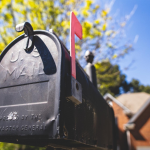Unable to get to the polls on Election Day? 
If you can't get to the polls because you have to work all day, are out of town, or are unable to go due to illness or other circumstances, you may order an absentee or emergency absentee ballot to vote by mail. To learn more about early absentee and absentee ballot voting check out The National Association of Secretaries of States and search for your state. Click on the icon to request an absentee ballot (powered by Vote.org).
Medical Emergency or Hospitalization: 
If you find that you have a medical emergency or are hospitalized during the election, you may be able to request an emergency absentee ballot. You must be registered to vote to request an absentee ballot. Patients may fill out an absentee ballot application right from their hospital bed. Once the ballot application is approved by the local Board of Election, the patient will receive an absentee ballot, which they can use to cast their vote and return to the Board of Election. Click on the icon to learn more about Patient Voting.
Living in a Nursing Home or Long-Term Care Facility?
Individuals who are living in nursing homes or long-term care (LTC) facilities may not be denied the right to vote. Staff at nursing homes and LTC facilities may conduct nonpartisan voter registration activities. While residents may not be medically cleared to leave the facility to vote, facilities in some states can utilize mobile polling, also known as supervised absentee voting. To learn more voting at a LTC facility check out the National Conference of State Legislatures website.
Military and Overseas Voters:
 Service members, their families and overseas citizens can register to vote and request an absentee ballot by filling out the Federal Post Card Application (FPCA) and sending it to their election office in their state of legal residence. The election office may approve, deny or request additional clarifying information. Once the FPCA is approved, the election office will send an absentee ballot, which the voter completes and returns to their election office by their state's deadline. Click on the icon to access the Federal Post Card Application and to learn more.
Service members, their families and overseas citizens can register to vote and request an absentee ballot by filling out the Federal Post Card Application (FPCA) and sending it to their election office in their state of legal residence. The election office may approve, deny or request additional clarifying information. Once the FPCA is approved, the election office will send an absentee ballot, which the voter completes and returns to their election office by their state's deadline. Click on the icon to access the Federal Post Card Application and to learn more.
Veterans:
The U.S. Department of Veterans Affairs allows for federal employees to assist VA clients and patients with registering to vote and acquiring absentee ballots. These activities must be nonpartisan. In addition, VA facilities may allow outside organizations to conduct nonpartisan voter registration and absentee ballot application activities. Each VA hospital is required to establish written policies outlining criteria for evaluating outside organizations' requests. For more information, please visit the VA’s website for information about the VA policy in particular or the U.S. Office of Special Counsel’s website for information regarding the Hatch Act more broadly.
Speak a Language other than English?
Individuals who do not speak English as their primary language have the right to cast their vote in their native language if they live in qualifying jurisdictions defined by Section 203 of the Voting Rights Act.
A jurisdiction is covered if the number of United States citizens of voting age in a single language group within the jurisdiction:
- Is more than 10,000, or
- Is more than five percent of all voting age citizens, or
- On an Indian reservation, exceeds five percent of all reservation residents; and
- The illiteracy rate of the group is higher than the national illiteracy rate.
Qualified jurisdictions must make all voting materials that are available in English also available in the language of the identified single language group(s) including absentee ballots.
Types of Absentee Ballots*
Regular Absentee Ballot: Absentee ballots are available for request in many states and are required by law to be made available for military service members and overseas citizens. These ballots are intended for voters who know they will not be available to vote at their polling station on the day of the vote, and thus allows them to still cast their vote in their absence. This is usually done by submitting a request to your state’s board of election, and then upon their approval a mail-in ballot will be sent to you. Each state has their own time constraints on when an absentee ballot can be applied for, and during the COVID-19 pandemic many states are allowing and encouraging voters to utilize absentee ballots.
Emergency Absentee Ballot: An emergency absentee ballot is similar to an absentee ballot, except it can be applied for closer to the day of election provided that certain requirements are met. Each state has its own unique set of requirements, but in general a medical emergency is sufficient to qualify for an emergency absentee ballot. The process for applying for an emergency absentee ballot also varies by state but is generally similar to applying for an absentee ballot.
*Definitions retrieved from https://www.usa.gov/voting-and-election-definitions